Photos courtesy IOM/Nicolae Grosu The Russian invasion of Ukraine has triggered the greatest refugee crisis on the European continent since World War II, with an estimated two million people fleeing the country, according to the United Nations.
One of the people those refugees are encountering as they cross into Moldova, a tiny neighbor to the west, is Joseph Lowry. Lowry, a native of Dublin who lives in Vienna, Austria, is a senior communications/media officer and spokesperson for the International Organization for Migration (IOM), which is overseen by the United Nations. In 2004, he earned an International Diploma in Humanitarian Assistance (IDHA) from the Institute of International Humanitarian Affairs.
Heading to the Ukraine Border
Lowry left Vienna on March 3 and arrived three days later at Moldova’s Palanca border crossing, near the Ukrainian port city of Odesa. He only had a brief chance to observe the scene there before he tested positive for COVID-19 and had to isolate in a hotel in the capital of Chișinău. But the visit still made clear the gravity of the situation.
“It so impossibly gargantuan, it’s hard to wrap your head around,” he said in a phone interview on March 8. Over 275,000 people had crossed this border at that point, he said. Some were arriving in packed S.U.V.’s; others only had that they could carry in suitcases. What was most heartbreaking was watching men say goodbye to their wives, mothers, sisters, and children.
“The men were turning around and walking back towards Ukraine with their shoulders up. Many of them were going back to fight, and they were proud, their chests were out. They were defiant, but obviously, they were heartbroken as well,” he said.
“The kids, you could see, didn’t realize what was happening, that daddy wasn’t going [into Moldova]yet, but they were. As a father, that for me was something I could identify with.”
Most of the refugees are passing through Moldova on their way to Romania and other European countries to the west, but they need a place to recharge, and in Chișinău, that has meant opening the Moldexpo, a small exhibition center that has served for the past two years as a COVID-19 treatment center. On March 8, it was housing 1,000 people, nearly double its intended capacity.
Telling the Story on the Ground
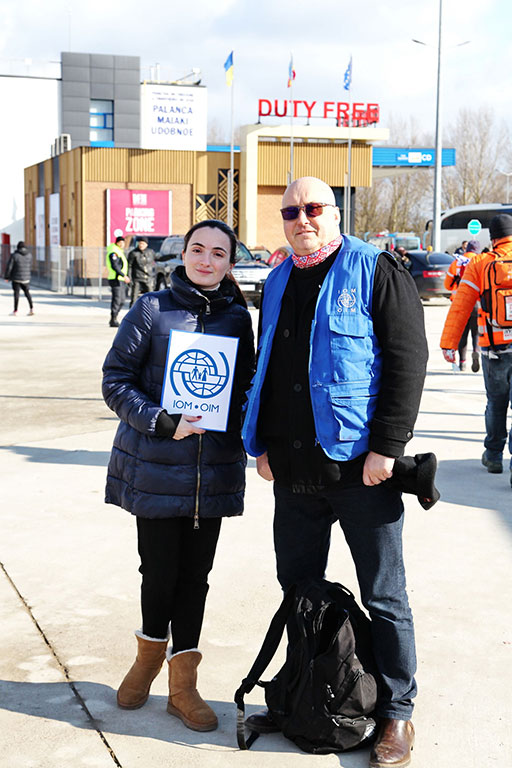
For Lowry and a small staff that traveled to Chișinău from Vienna, the job is to tell the story of not only the refugees through his Twitter account and his blog, but of the staff based in Moldova, who are supervising tasks like the procuring of scanners that can quickly read the documents of people waiting to cross the border.
In some ways, this humanitarian crisis is familiar to Lowry, who has been working in the field since 1993 and has been dispatched after natural disasters to places such as Myanmar and Somalia. At the same time, the magnitude here is much worse, he said.
Working in the media, for instance, he said he’s accustomed to a weeklong window after an emergency where the media lets them tell their story before questions about supply bottlenecks become sharper. But he doesn’t expect that now.
“My sense is that won’t happen this time because this is just unlike anything else. The media can see from where they are that it’s not going to be easy to get humanitarian aid to where it needs to get to because there’s still a war going on,” he said.
When it comes to helping, Lowry said that it’s natural that people might want to donate goods, but the answer, he said, is cash, cash, and more cash.
“We can buy in bulk locally, so we’re supporting the local market. We can get stuff across borders because we have arrangements with the border authorities. We can move things into where they’re needed,” he said.
The Most Difficult Challenge
Larry Hollingworth, the director of the IDHA, said the trainings, which have taken place for 20 years at Fordham, as well as in Africa, Asia, the Far East, and Latin America, are inexorably intertwined with day-to-day operations such as Lowry’s. While every call to action differs by the cause of the crisis, access, climate, geography, the physical and mental state of the population, and resources available, he said war is the most difficult challenge.
“Humanitarian aid workers pride themselves on a response which is neutral, impartial, and independent. We try not to take sides. In many crises, this is very hard, because there is an oppressor and an oppressed. Such is the case in Ukraine today. We have resources, we have the expertise, we have the humanitarian imperative to respond, but we have very limited access,” he said, noting this the war has quickly morphed from a regional crisis to a global one.
“There is so much more we could do if the population had egress. This is a cruel barbaric war that it is a dark stain on the Russian nation. They are deceived by the propaganda and lies of a small group of their leaders.”
Hollingworth suggested that we should prepare for the long haul, as history and experience tell us that the forced migrations of the millions of people from Ukraine will lead to protracted crises, and it may be decades before all who left return.
“We must also never forget that this is but one crisis. Its location has projected it to the front stage,” he said.
“The humanitarian community is facing huge challenges in many other parts of the world where the media coverage and the resource’s response is at best minimal.”
Lowry, meanwhile, is hoping to rejoin his team soon. He will return to Vienna for a break but will likely be back again. His second daughter was born in Kyiv, and he still has friends who live there.
“The thought of Kyiv being reduced to rubble, it’s as heart-wrenching as if it were happening to Dublin,” he said.
The Institute of International Humanitarian Affairs, which was founded in 2001, is a university-wide center that reports directly to Fordham’s Office of the President. It serves as a bridge between academia and humanitarian efforts by hosting training courses, publishing reports on a wide range of humanitarian topics, and hosting events that create an increased understanding of global humanitarian crises.
]]>
The ceremony, held on June 29 at the Lincoln Center campus, honored 32 IDHA graduates and two graduates of the Master of Arts in International Humanitarian Action program, a joint degree offered by the International Institute of Humanitarian Affairs and the Graduate School of Arts and Sciences. The students hailed from 24 countries, including Senegal, Dublin, Kuala Lumpur, and Nairobi. They followed the 51st IDHA class, whose course took place in Geneva in November and December.
An Uncertain Future
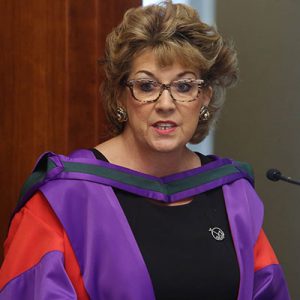
“It’s the best of times because you leave this gold standard education establishment prepared for your role,” Nason said.
“It’s the worst of times because you will now be called on to bring aid to the needy, rescue the desperate, and protect and save lives in the most unstable and fragile international environment we’ve seen in a very long time.”
She noted that cascading conflicts last year plunged 350 million children and young people into situations where they require humanitarian aid, and that today nearly one person is forcibly removed from their home every two seconds.
“As a diplomat, I regret that we haven’t turned the dial. I regret that we seem to appear to step back and at times and seem paralyzed in the face of profound humanitarian suffering,” she said. But she added that the graduates should take to heart Robert Kennedy’s instructions to send forth that “tiny ripple of hope.”
“That’s what changes the world—that one act gives us hope. Please keep yourself ready for that moment. We need it badly,” she said.
Savoring Bonds Forged
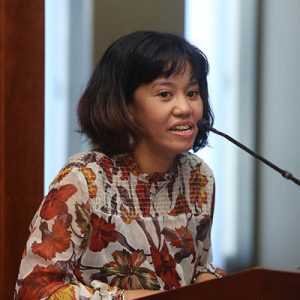
Liwliwa Agbayni, who delivered the IDHA student address, reflected on the deep bonds that she formed with fellow members of her “syndicate,” one of several teams formed among her cohort when they began the monthlong program on June 3.
She and her classmates had a lot in common, she said, with the eggs that they dropped from 16 feet up during an exercise in their engineering course on their second day.
“Thirty days later, [we are]cracked, wounded, bruised, and badly in need of a good night’s sleep, nevertheless, unbroken and still standing strong. Bravo.” she said.
In his farewell speech, IDHA course director Mark Little, M.D., harkened back to his native Australia, where Dutch explorer Dirk Hartog left behind a pewter plaque upon his arrival on the county’s western shore in October 1616.
“He landed in a dry, dusty, hot desolate area, which is where many of you go to look after many of the people that have been displaced around the world,” he said.
Yes We Must
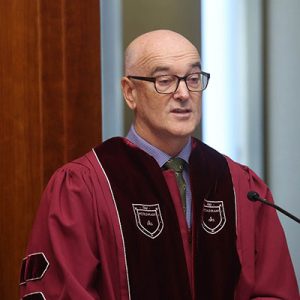
Humanitarian issues aren’t solved purely by humanitarians though; ultimately, they’re solved by politicians, and Little noted that graduates and audience members should not hesitate to speak out to them.
The case of Ali, a 63-year-old Afghani refugee that Australia had been holding in detention on the Micronesian island nation of Nauru, illustrates this perfectly, he said. Ali has been diagnosed with advanced lung cancer and is in need of palliative care that cannot be provided on Nauru. Australia offered only to send him to Taiwan for hospice care—an option he rejected because no one there speaks his language or is able to perform Shia Muslim rituals and ceremonies on his body. Fortunately, Australian citizens recently got wind of their government’s actions.
“In 48 hours, two and a half thousand Australian doctors and 25,000 members of the Australian public signed a petition and campaigned to have this dying man moved to Australia. He moved on Sunday,” Little said.
“It is up to all of us to speak out. It’s not, ‘Yes we can!’ but, ‘Yes we must!’ Be like Hartog 400 years ago. Leave your mark as a humanitarian and an IIHA graduate. And wherever you go, may your god go with you and keep you.”
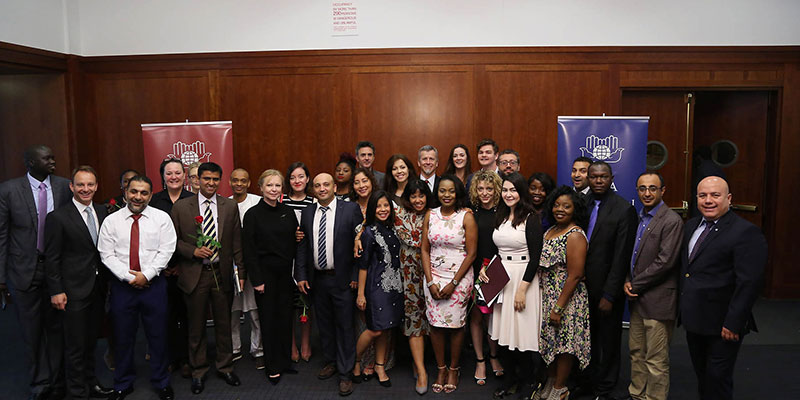
The ceremony, held on June 30 at the Lincoln Center campus, honored 25 IDHA graduates and two recipients of the Master of Arts in International Humanitarian Action program. The students hailed from 17 countries around the world, including Italy, Tajikistan, New Zealand, Egypt, Poland, and Pakistan.
The Oscar-winning actor, whose film credits include Taxi Driver, The Godfather: Part II, Raging Bull, and who appeared most recently as Bernard Madoff in HBO’s The Wizard of Lies, told the graduates that they were “true humanitarians” because they “served with compassion and dignity” while making sacrifices and taking “heroic risks.”
“Now you’ve gone through this program so that you can perform your work more effectively,” he said. “You have distinguished yourself here, and you will take those lessons with you for the rest of your life.”
De Niro, who received an honorary diploma, said that while many people might solely deem humanitarian workers as “wonderful people doing heroic work,” he considered them “shining examples of what can be achieved when you find the humanitarian hidden inside.”
“By inspiring others, you increase your impact exponentially,” he said before reading the names of the entire graduating class. “You are my heroes,” he told them.
Bart Vermeiren, who delivered the IDHA participant address, said completing the program is a huge milestone.
“We all embark on a new or old journey in our lives, but one day or another, sooner or later, we will use our IDHA wisdom and put it into practice with our learning experiences to the benefit of ourselves, and, most importantly, to the benefit of the people in need,” he said.
It’s a message that resonated with Naomi Gikonyo, a humanitarian practitioner with nearly a decade of experience in emergency response interventions in countries including Haiti, Libya, South Sudan, and Kenya.
“This program has pushed me to apply a lot of what I’ve learned into the field,” said Gikonyo, who works as an emergency preparedness and response officer for the United Nations World Food Programme. “It’s instrumental because we’re dealing with humanitarian crises with high complexities.”
Brendan Cahill, executive director of the Institute of International Humanitarian Affairs (IIHA), said IDHA ceremonies have been held around the globe, from Dublin and Berlin to Seoul and Pretoria.
“You are a treasured part of our IDHA family [from]all over the world,” he said. “Make use of it. Continue to give back, continue to come back, continue to be in touch and be involved with our programs no matter where you are or where we are.”
After 20 years of courses and 3,000 participants representing 140 nationalities, Larry Hollingworth, director of humanitarian programs at Fordham’s Institute of International Humanitarian Affairs, which runs the IDHA program, said IDHA continues to create impact.
“We are in that unique position that we’re not in uniform, but we find ourselves on the front line,” he told the graduates, whom he said are leading emergency medicine in makeshift hospitals, opening schools in remote camps, and “staying on when others have left.”
“Stand up for your values, and your beliefs. Do what you want to do. Be bold and be brave.”
]]>- What is the single biggest obstacle facing humanitarian aid workers today?
Without a doubt, the single biggest obstacle is access. We are able to produce a lot of the resources that are needed by the beneficiaries—those refugees or displaced persons. Our problem is that we can’t get to them.
In many of the countries where we operate, we can’t deliver food and other things because of political obstacles. For example, to deliver aid in Syria today, agencies have to cooperate with whatever limits [President] Assad wants to impose—that includes which agency we can deliver aid through, and where the aid can go. Obviously he is not going send aid into the areas that are opposing him. Therefore it makes it very difficult to deliver aid neutrally, impartially, and independently. There are enclaves where no medicine has gone in for years, no anesthetics. You are putting people in medieval conditions. And it’s not just Syria. Almost everywhere we go, oppositions want to stop humanitarian agencies from delivering aid.
- Is there another significant obstacle?
The other point is that money is tight. We are probably about a billion dollars short for the crises we have today in the world. In the 1990s most of the large agencies were a third of the size they are today and there were not many small independent NGOS. If a crisis got 20 or 30 agencies, that was a good turnout.
There were more than a 1,000 agencies that responded to the 2010 Haiti earthquake crisis. Where did they all come from and the question we could ask—which is suitable to this ground—is how qualified are they to be there? No one wants to deny the good heart, but there are too many agencies vying for the same monies.
- Is forced migration overloading global humanitarian efforts?
The migration problem is massive. In the humanitarian aid world, we work with internally displaced people and refugees forced from their countries [as opposed to economic migrants]. People are fleeing from violence. They are saying there are 65 million people displaced in the world, a huge number. And it doesn’t seem to be getting any lower.
The economic migrant is the larger portion of migrants–coming from countries in desperate straights because of climate disasters or violence. It is very difficult to measure their numbers, very difficult to control them, very difficult to send them back, and very difficult to house them in your country.
Sadly, the animosity and aggravation that people have toward migrants is going to grow. To be honest, migrant populations are one lever for Britain to have made the choice that it did last week [on Brexit].
If there was peace and there were jobs in their own countries, most migrants would stay. Some people say wouldn’t it be better spending our money on creating peace, rather than providing aid for the people who are displaced. Now, we are back into money and political will.
But we are not doing enough about prevention.
- How does the IDHA program address these problems?
One of the strengths of the program is that we are up to date. We look at every crisis as it is today, not from 5 years ago. Every student that we have is going out to today’s crises, and what we did a decade ago no longer applies.The moment you get on the ground in any crisis, in the first few hours everything changes. The police should be there; they’re not. The government should be there; it’s not. Everything is changing constantly.
In order to make sure we are up to date, we change our lecturers each and every term. We bring them in strait out of the field. This session we had a young Kenyan woman who has been in the field for 5 or 6 years. We have two people who were just in Gaza. These lecturers can talk about the ethical or political questions, or even about communications problems, because they were literally just there.
Whether they can tell us that ‘it worked,’ or ‘it would work better with something else,’ they remind us that humanitarian aid is a moving philosophy—and you have to go with it.
]]>

On Tuesday, Oct. 15, Fordham’s Institute of International Humanitarian Affairs will present a panel discussion on neutrality, humanitarian principles, and more, co-sponsored with the Consulate General of Switzerland in New York: “Current Humanitarian Challenges–Two Perspectives: Switzerland and the ICRC,” features a discussion between speakers Ambassador Francois Garras, consul general of Switzerland in New York, and the IIHA’s Executive Director Brendan Cahill.
Panelists commenting include Ambassador Manuel Bessler, head of the Humanitarian Aide Department for Swiss Agency for Development and Cooperation, and Walter Füllemann, head of delegation to the United Nations, International Committee of the Red Cross.
Larry Hollingworth, visiting professor at Fordham’s Institute of International Humanitarian Affairs, will moderate.
2 p.m. | 12th-floor Lounge/Corrigan Center, Lowenstein Center, Lincoln Center Campus
Those interested in attending should contact Kasia Laskjowski at [email protected]
]]> A visiting professor of humanitarian studies at Fordham was lauded by the State Department on April 6 for helping refugees in the former Yugoslavia.
A visiting professor of humanitarian studies at Fordham was lauded by the State Department on April 6 for helping refugees in the former Yugoslavia.
Larry Hollingworth was among seven honorees cited by Secretary of State Hillary Rodham Clinton for playing leading roles in refugee crises around the world.
Hollingworth headed the Sarajevo office of the United Nations High Commissioner on Refugees in 1994. In that role, he negotiated humanitarian access to towns besieged by fighting, Clinton said.
He led convoys of food trucks through combat lines, evacuated hundreds of women and children, and warned the world about the dangers of Srebrenica months before 8,000 Bosnian men and boys were massacred there in July 1995.
“In times of war and catastrophe, some people lose their moral bearings. But others find inside themselves a compass that steers a true course through fear and chaos,” Clinton said. “Larry Hollingworth is one of those people.
“Those who serve in war zones discover the hard realities of trying to deliver aid, extricate refugees, negotiate ceasefires and protect civilians, she continued. “Larry brought courage, political acumen and moral clarity to a seemingly impossible situation.”
Hollingworth works with the Institute of International Humanitarian Affairs (IIHA) at Fordham and is the humanitarian programs director for the Center for International Health and Cooperation (CIHC). The other honorees included:
• Harriet Tubman for helping more than 70 slaves escape to freedom using the Underground Railroad;
• Raoul Wallenberg, a Swedish diplomat, for assisting people persecuted by the Nazis during World War II;
• the U.S.S. St. Louis, a ship that transported many Jewish survivors of the Holocaust to Palestine;
• Josephine Dusabimana and Mbaye Diagne for saving Tutsi Rwandans from genocide; and
• Mina Jahic for assisting Bosnian War refugees.
Hollingworth said if he had to pick one word to describe how he felt at the ceremony, it would be overwhelmed.
“I refused to believe it until it actually took place,” he said. “I hope that the two heroes of mine—Mr. Wallenberg and Ms. Tubman—do not object from wherever they look down upon us. But they know that I got it as the leader of a team effort.
“I thank all those who worked with me,” he added. “I must further say that all at the State Department were so gracious and generous. It was an outstanding day for me.”
As a sign of appreciation, the State Department dedicated a room at its headquarters to the honorees. The ceremony occurred on the 60th anniversary of the 1951 Convention Related to the Status of Refugees. This international document defines the rights of refugees and the legal obligation of states to protect them.
]]> Administering humanitarian aid is becoming increasingly difficult as natural disasters and wars displace more and more people, Ibrahim Gambari, Ph.D., the United Nations undersecretary general for political affairs, told graduates of Fordham University’s International Diploma in Humanitarian Assistance (IDHA) program.
Administering humanitarian aid is becoming increasingly difficult as natural disasters and wars displace more and more people, Ibrahim Gambari, Ph.D., the United Nations undersecretary general for political affairs, told graduates of Fordham University’s International Diploma in Humanitarian Assistance (IDHA) program.
Gambari, Nigeria’s longest-serving ambassador and permanent representative to the UN, delivered the commencement address at the 22nd IDHA graduating class on June 29 at the Lincoln Center campus, where he was also presented with an honorary diploma. He used war-torn Iraq as an example of challenges facing aid workers in the new century.
“The security situation has affected the UN’s ability to carry out its activities. . . gross violations of human rights, including killings, kidnappings and torture continue unabated in many parts of the country,” he said. “If [the situation]continues, the political and social fabric of the country could affect the stability and security of the whole region. We have to give the people of Iraq some hope that help is on the way.”
Gambari outlined UN initiatives in Iraq that would protect the aid workers and would stimulate long-term economic development, as ways to alleviate the suffering.
In all, 36 students from 25 nations received the program’s International Diploma in Humanitarian Assistance after completing the monthlong course at Fordham. The program is designed to help humanitarian aid professionals function more effectively in times of “complex emergencies,” including wars and natural disasters. Since its inception in 1997, the program has graduated 830 workers from 113 nations.
The course is directed by Larry Hollingworth and administered under Fordham’s Institute of International Humanitarian Affairs.
]]> Fordham University’s Institute of International Humanitarian Affairs (IIHA) will hold a wide-ranging discussion about the worsening crises in Sudan’s Darfur region and Chad with humanitarian aid workers who have provided assistance to victims in the region on Thursday, June 21, at 8:30 a.m. in the 12th-Floor Lounge, Lowenstein Center, on the Lincoln Center campus.
Fordham University’s Institute of International Humanitarian Affairs (IIHA) will hold a wide-ranging discussion about the worsening crises in Sudan’s Darfur region and Chad with humanitarian aid workers who have provided assistance to victims in the region on Thursday, June 21, at 8:30 a.m. in the 12th-Floor Lounge, Lowenstein Center, on the Lincoln Center campus.
Moderated by Larry Hollingworth, IIHA’s director of humanitarian programs, the session will feature a lecture on Chad by Gonzalo Sanchez-Teran, a Jesuit Relief Services’ (JRS) project director who coordinates educational projects in the Goz Beida and other camps for internally displaced persons in the central African country, and a plenary session on Darfur as part of the institute’s International Diploma in Humanitarian Assistance Program.
Aid officials have called the humanitarian crisis in eastern Chad no less severe than the one in Darfur. Estimates place the number of refugees from Sudan and the Central African Republic in Chad’s eastern and southern border areas at more than 280,000.
The plenary session on Darfur will feature aid workers from organizations throughout the world who will discuss efforts to provide assistance in one of the world’s most unstable regions. The four-year-old crisis in Darfur has claimed the lives of some 200,000 people as rural villagers have come under attack by Arab militias, known as janjaweed, which many observers believe are armed by the Sudanese government.
The monthlong diploma program at Fordham, which draws students from organizations throughout the world, helps aid professionals function more effectively in times of “complex emergencies,” including wars and natural disasters. The program, which enrolled 38 humanitarian aid professionals from 25 countries this year, is run by the IIHA.
]]>